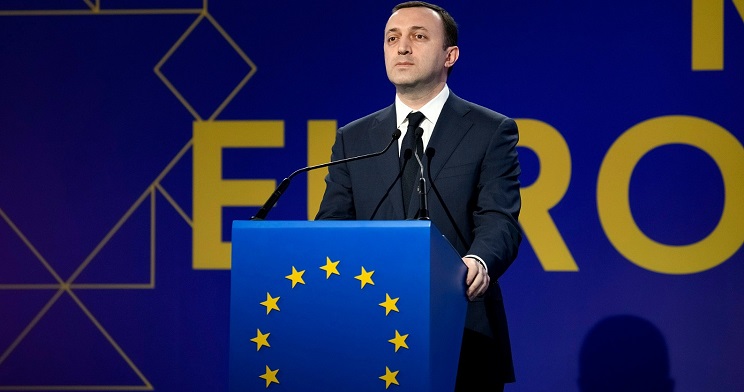PM: Georgia will receive EU candidacy “thanks to Gov't efforts”, despite attempts by "domestic, foreign enemies”

The PM said the day was a “summary of the 11-year rule of the Georgian Dream Government”. Photo: EU in Georgia press office
Georgian Prime Minister Irakli Garibashvili on Wednesday said he believed Georgia would receive the European Union membership candidate status in December following the positive recommendation of the European Commission, and hailed his Government's efforts to ensure “key changes” for the objective despite “coordinated attempts” by “domestic and foreign enemies”.
In a press briefing after the Commission made public its recommendation for the status to be granted to the country, the PM said the day was a “summary of the 11-year rule of the Georgian Dream Government”, which he said had ensured “peace, stability, great transformation and key changes”, including for the country’s European future.
If any Government has done something tangible on the path of European integration, it is the Georgian Dream Government”, Garibashvili said, and noted the country had achieved “unprecedented peace and stability despite severe challenges and complicated security environment in the [South Caucasus] region” - a result he said would have been “impossible” without Bidzina Ivanishvili, the former PM and the founder of GD, and the state’s authorities.
Pointing to “close cooperation” with the country’s European partners, the PM said the Commission’s recommendation had marked the “victory of the country and its people, despite numerous destructive actions, provocations coordinated by the country’s domestic and foreign enemies”.
He stressed the “radical wing” of the country’s opposition - the term used by GD officials to describe the United National Movement and affiliated opposition groups - had “done nothing” for Georgia’s EU integration.
Recalling the EU’s refusal last year to grant Georgia the candidate status as “disappointing”, the PM said the latest decision had caused “pride”.
The European Commission said it was recommending the EU candidacy for the country with nine conditions, ranging from efforts to combat disinformation and foreign information manipulation about the EU and its values, to further alignment of the country’s foreign and security policies with the bloc, to reforms in the judiciary, electoral and human rights areas.
The conditions also include ensuring a systemic approach to deoligarchisation, additional efforts for depolarising the domestic political environment and improvements to the Parliament's oversight function.
 Tweet
Tweet  Share
Share